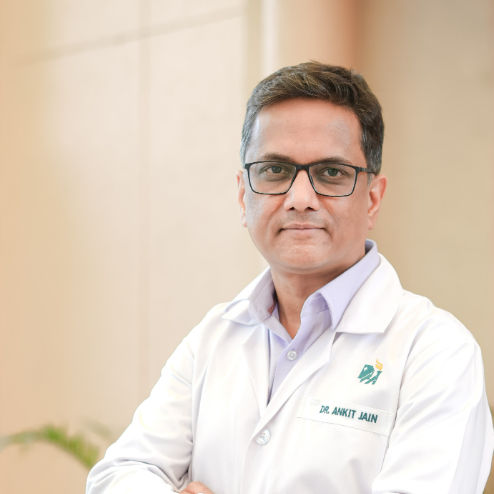Brain Cancer
Learn about brain cancer, including its types, symptoms, causes, stages, diagnosis, and treatment options. Discover how brain tumours are detected and the various therapies for managing this complicated condition.

Written by Dr Shreya Sarkar
Last updated on 3rd Jul, 2025
Brain Cancer Guide: Symptoms, Causes, Stages, Diagnosis, and Treatment Options
Brain cancer is a severe health condition that can affect individuals of any age and can be experienced with various symptoms that differ based on the type and location of the tumour. The locations that can be affected by tumour growth include nerves, the pituitary gland, and protective membranes covering the brain's surface.
This article provides an overview of brain cancer, its causes, risk factors, diagnosis, treatment options, and much more to help patients and their families through this difficult time.
What is Brain Cancer?
Brain cancer occurs when cells in the brain grow uncontrollably, resulting in tumours. It may also originate from cancer spreading from other locations in the body (secondary or metastatic brain cancer).
Even though primary brain cancers are rare, secondary brain cancers are about five times more common, as malignancy from any organ may metastasise in the brain.
What are the Types of Brain Tumours?
Tumours in the brain are typically grouped depending on their location within the brain along with the upper spine. They are also graded based on their rate of growth. The grading is from 1 to 4, where grade 1 signifies the slowest growth and grade 4 comprises the fastest growth.
The major types of brain tumours are discussed below:
Glioma: These tumours start in glial cells and generate about 30% of brain cancer cases.
Meningioma: Usually benign and slow-growing, these tumours develop in the tissue surrounding the brain and spinal cord and are the most common brain tumours in adults.
Astrocytoma: It is a type of glioma that includes glioblastomas, which grow quickly.
Ganglioglioma: These are slow-growing tumours found in neurons and glial cells, often treated with surgery.
Schwannomas: These are slow-growing tumours around cranial nerves and are almost always benign.
Craniopharyngiomas: These are slow-growing tumours between the pituitary gland and the brain, which can press on optic nerves and cause vision problems.
Medulloblastoma: These are fast-growing tumours that arise from nerve cells in the brain, more frequently seen in children.
Differences Between Primary and Metastatic Brain Tumours
Primary brain tumours are neoplasms that originate within the brain itself. Common examples include meningioma and gliomas. Although rare, these tumours can detach and disseminate to other regions of the brain and spinal cord.
Often, tumours from other areas of the body metastasise to the brain. Also called secondary brain tumours, metastatic brain tumours are malignant growths that begin as cancer in other parts of the body before spreading to the brain. These tumours are approximately four times more prevalent than primary brain tumours and can multiply quickly, leading to the compression or invasion of adjacent brain tissue.
Causes and Risk Factors of Brain Cancer
Here are the notable risk factors that can cause brain tumours and eventually lead to brain cancer:
Increased age
A familial background of brain cancer
Long-term tobacco use
Exposure to pesticides, herbicides, and fertiliser
Working with elements that can cause cancer, like plastic, rubber, lead, petroleum, etc.
Having an Epstein-Barr virus infection or mononucleosis
Symptoms and Signs of Brain Cancer
The major signs of brain cancer can differ based on its location, size, and type. Common symptoms include:
Severe headaches
Seizures
Sleeplessness
Problems with hearing
Numbness or tingling in the face
Nausea or vomiting
Challenges with thinking, speaking, or comprehending language
Changes in personality
Weakness or paralysis on one side of the body
Dizziness or balance issues
Visual disturbances
Confusion and disorientation
In case any of these symptoms appear in an individual, it is essential to consult the healthcare provider.
Get Expert Guidance for Your Symptoms
Diagnosis of Brain Cancer
Healthcare providers conduct certain tests and examinations to detect brain cancer. These include:
Brain MRI or CT Scan: An MRI (Magnetic Resonance Imaging) is the most effective method for detecting brain tumours. If an MRI is not possible, a CT (Computed Tomography) scan serves as a suitable alternative.
Biopsy: Often, a biopsy is performed to identify the type of the tumour and analyse its nature. A neurosurgeon may obtain a sample during surgery to examine the tumour. If the tumour is difficult to reach, a stereotactic biopsy may be performed.
Spinal Tap (Lumbar Puncture): This procedure involves using a small needle to extract cerebrospinal fluid (CSF) from the area surrounding the spine. The collected fluid is then assessed in a laboratory for the presence of cancer cells.
Specialised Tests: Additional examinations may aid in the diagnostic process. For example, the doctor might perform tests to analyse the blood and cerebrospinal fluid (CSF) for tumour markers, which are substances produced by certain tumours.
Staging and Grading of Brain Tumours
The brain tumour is classified into four distinct stages. These include:
Grade 1 Brain Cancer: In this stage, the cells appear nearly like normal brain cells, and they develop slowly. Surgical removal of the tumour is often feasible.
Grade 2 Brain Cancer: Tumours in this category also grow slowly but have the potential to invade adjacent tissues or return after treatment.
Grade 3 Brain Cancer: Characterised by rapid growth, these tumours are likely to spread to nearby tissues, and the tumour cells exhibit significant differences from normal cells.
Grade 4 Brain Cancer: This grade involves tumours that grow and spread at an accelerated rate, with tumour cells that appear markedly abnormal compared to healthy cells.
Treatment Options for Brain Cancer
The patient may have to undergo one or more treatments based on the type, size, and location of the brain tumour. Here are the key treatment methods for brain cancer:
Surgery: Often, neurosurgeons perform surgery based on the location and type of brain tumour. Surgery can eliminate the tumour, potentially serving as the key treatment method. It can also curb symptoms associated with the tumour, like decreasing pressure inside the skull.
Chemotherapy: These medications can kill cancer cells within the brain and reduce the size of the tumour. The patient may receive chemotherapy either by mouth or through an IV (intravenous chemotherapy).
Radiation Therapy: This method uses high-energy waves, like X-rays, to eliminate tumour tissue and cancer cells that cannot be surgically removed.
Combination Therapy: When chemotherapy and radiation therapy are given together, it is known as combination therapy.
Immunotherapy: Also called biological therapy, immunotherapy is a type of treatment that utilises the body’s immune system to fight cancerous cells.
Rehabilitation: If the cancer or its treatment methods hinder the ability to speak, walk, or perform daily activities, the patient may need rehabilitation.
Alternative Therapies: Some healthcare providers suggest maintaining a balanced diet and consuming vitamins and minerals to help replace nutrients lost during treatment.
Conclusion
Brain cancer is a complex medical condition, and early detection plays a vital role in improving survival rates and quality of life. Patients suffering from this condition should maintain a healthy lifestyle and seek medical assistance from oncologists to cope with the physical and emotional challenges associated.
Consult Top Oncologists
Get Expert Guidance for Your Symptoms

Dr. Tarun Jindal
Uro Oncologist
14 Years • MS (AIIMS, New Delhi), MCh (Gold Medalist), Fellow, VUI, Henry Ford Hospital, Detroit, USA; Robotic and Laparoscopic surgeon
Kolkata
Apollo Multispeciality Hospitals , Kolkata, Kolkata
(100+ Patients)

Dr Nikhil Suresh Ghadyalpatil
Oncologist
18 Years • MBBS, MD (G. Med), DNB (G.Med), MNAMS DM (Medical Oncology - Tata Memorial Hospital) European Certification In Medical Oncology (ECMO) MRCP (Med Onco SCE), PDCR
Hyderabad
Apollo Hospitals Jubilee Hills, Hyderabad

Dr. Sandeep Muzumder
Radiation Specialist Oncologist
21 Years • MBBS (JIPMER, Pondicherry), MD (AIIMS, New Delhi)
Bhubaneswar
Apollo Hospitals Old Sainik School Road, Bhubaneswar

Dr Ankit Jain
Medical Oncologist
20 Years • MBBS, (MAMC Delhi), MRCP Oncology (London), MRCP Medicine (London), MSC Oncology(UK) CCT(UK)
Delhi
Apollo Hospitals Indraprastha, Delhi
(25+ Patients)

Dr. Gopal Kumar
Head, Neck and Thyroid Cancer Surgeon
15 Years • MBBS, MS , FARHNS ( Seoul, South Korea ), FGOLF ( MSKCC, New York )
Delhi
Apollo Hospitals Indraprastha, Delhi
(25+ Patients)
Consult Top Oncologists

Dr. Tarun Jindal
Uro Oncologist
14 Years • MS (AIIMS, New Delhi), MCh (Gold Medalist), Fellow, VUI, Henry Ford Hospital, Detroit, USA; Robotic and Laparoscopic surgeon
Kolkata
Apollo Multispeciality Hospitals , Kolkata, Kolkata
(100+ Patients)

Dr Nikhil Suresh Ghadyalpatil
Oncologist
18 Years • MBBS, MD (G. Med), DNB (G.Med), MNAMS DM (Medical Oncology - Tata Memorial Hospital) European Certification In Medical Oncology (ECMO) MRCP (Med Onco SCE), PDCR
Hyderabad
Apollo Hospitals Jubilee Hills, Hyderabad

Dr. Sandeep Muzumder
Radiation Specialist Oncologist
21 Years • MBBS (JIPMER, Pondicherry), MD (AIIMS, New Delhi)
Bhubaneswar
Apollo Hospitals Old Sainik School Road, Bhubaneswar

Dr Ankit Jain
Medical Oncologist
20 Years • MBBS, (MAMC Delhi), MRCP Oncology (London), MRCP Medicine (London), MSC Oncology(UK) CCT(UK)
Delhi
Apollo Hospitals Indraprastha, Delhi
(25+ Patients)

Dr. Gopal Kumar
Head, Neck and Thyroid Cancer Surgeon
15 Years • MBBS, MS , FARHNS ( Seoul, South Korea ), FGOLF ( MSKCC, New York )
Delhi
Apollo Hospitals Indraprastha, Delhi
(25+ Patients)
